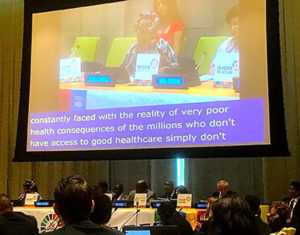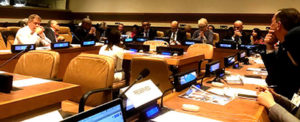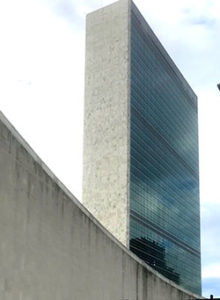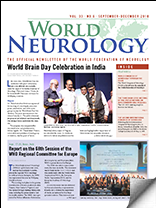By Wolfgang Grisold, MD
“Time to deliver, leaving no one behind.”
The third high-level meeting of the United Nations (U.N.) on Non-Communicable Diseases (NCDs) was held Sept. 27 at the UN in New York City. It scaled up multistakeholder and multisectoral responses for the prevention and control of NCDs in the context of the 2030 Agenda for Sustainable Development. The World Federation of Neurology (WFN), represented by Wolfgang Grisold, was able to participate in this high-level meeting through the support of the Austrian Society of Neurology and the Austrian Health ministry.

Mrs. Mandela speaking on health issues.
The meeting was attended by heads of state and government, parliamentarians, ministers of foreign affairs, finance, and health, heads or senior representatives of relevant United Nations entities, civil societies, the private sector, philanthropic foundations, academia, medical associations, indigenous leadership, and community organizations. The meeting highlighted the importance of non-communicable diseases for the WHO.
Non-communicable diseases such as stroke, dementia, other degenerative diseases, brain cancer, and neuromuscular diseases are an important part of neurology. In particular, stroke and the recent modifications of the ICD-11 classification, aim toward an improvement of the care of stroke patients worldwide. To continue this important development is a critical task of the neurological community.

WHO Secretary General Tedros Adhanom Ghebreyesus.
The meetings follow a structured pattern, with openings, plenaries, and various dedicated side meetings. There were key speakers, and following these, many speakers from states around the world illuminated the multitude of aspects of NCDs. The efforts are directed to achieve the Sustainable Development Goals, in particular Goals 3 and 4.
There were several interesting keynote speakers, such as Mr. Bloomberg, Mrs. Mandela, director general of the WHO Tedros Tedros Adhanom Ghebreyesus, and several ministers of health, who gave key speeches on the importance of preventing diseases, including the influence of modern lifestyle, the need to reduce sugar content in food, the adaptation of nutrition, excess of sodium, and the recreational abuse of tobacco and alcohol. These changes are spreading fast around the world, making the prevention of NCDs a high priority.

U.N. building, where the meeting took place.
The greatest attention was directed toward diabetes, cardiovascular diseases, and cancer, and also the issue of vaccination. The issue of dementia and other neurological diseases was mentioned by only a few speakers and countries, and it will be a mission of the neurological WFN community to act on their local and international level on behalf of the recognition of neurological disease. The worldwide need for palliative care was only mentioned by one speaker (Somalia), although it is an important issue worldwide.
However, stroke was included in the list: The heads of state and government committed to 13 new steps to tackle non-communicable diseases, including cancers, heart and lung diseases, stroke, and diabetes, and to promote mental health and well-being.
Another important side meeting was directed toward Universal Health Coverage (UHC) in emergencies. This is an important aspect and should provide help for persons in need following an emergency such as catastrophes, but also outbreaks of diseases such as ebola. The need for this was emphasized by Director General Tedros from the WHO.
“Leaving no one behind” is applicable for the prevention and treatment of NCDs and needs to be available universally in medical emergencies.
This meeting not only acknowledges the need for further care of NCDs and highlights the problems worldwide, but also clearly reveals that the advocacy for neurological diseases needs to be increased.
In all sessions, speeches were allowed from countries as well as a few organizations such as non-governmental organizations (NGOs). The meeting allowed listening to a worldwide representation of speakers who gave presentations of their local health systems and also of their efforts to take active measures against NCDs. •
